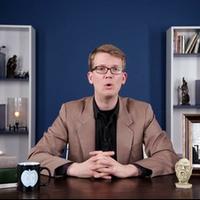05b. Cartesian Skepticism - Neo, Meet Rene. Part 2/2.
But what if ... EVERYTHING IS A DECEPTION?
What if everyone is experiencing the same false reality, from birth until death? What if nothing is as it seems, just like in The Matrix? This type of doubt, the kind you can't step out of, and thus can't check, is called global doubt.
And it's the subject of this week's Flash Philosophy. Let's go to the Thought Bubble. Philosopher Bertrand Russell illustrated the concept of global doubt with this troubling thought: What if the universe was created just five minutes ago? In this scenario, known as the Five Minute Hypothesis, the creator of the universe could have designed many elements of the world to make them appear “pre-worn,” so as to seem old.
From dinosaur bones – fashioned by the creator, and planted for us to find, to that scar on your knee – put there by the creator, along with the pre-loaded false memory of how you got it. It seems crazy, but there's just no way to prove that it isn't the case. The question for Russell was -- does it matter?
Descartes thought it did. But as a good Catholic, he couldn't fathom a world in which God would plant globally false beliefs in all of our minds. So instead, he posited the existence of an Evil Genius, whose purpose in life was to deceive us, and who was clever enough to do it.
Descartes didn't exactly think such a being was likely to exist. But he realized there was no way to rule out his existence. And as long as an Evil Genius was possible, he worried that we were all stuck. Stuck in a radical skepticism, in which we really cannot trust any of our beliefs. Everything we believe, every sense experience, every thought, they could all have been put in our minds by the Evil Genius, who created an illusory world so seamless, we'd have no way of detecting the illusion.
Just like the machines created for the characters in The Matrix. Descartes was at the point of despair.
But then...he realized something. He had cause to doubt everything. Everything EXCEPT the fact that he was doubting. He knew he was doubting.
He could be sure of that. And if he was doubting, then he must exist – at least as a thinking thing. After all, a doubt is a thought, and if there is thought, there must be a thinker having those thoughts. So Descartes decided that he couldn't know that he had a body – what he believed to be his body could've been part of the Evil Genius' deception. But he must have had a mind, or he couldn't have been having these thoughts. This was Descartes's ah-ha moment. In his book, Meditations on First Philosophy, he declared: Cogito ergo sum.
“I think, therefore, I am.” It's one of the most famous realizations in philosophy – I cannot doubt my own existence. I can doubt everything else, but I can't doubt I am, bare minimum, a mind having thoughts. This was Descartes' foundational belief, the first belief he put back in his apple basket. And from there, he figured he could build back up to more certain beliefs. Once he was certain that he was a thinking thing, he began examining his thoughts.
And one of his most clear thoughts – what he called a clear and distinct idea – was that God exists. He gave an argument for this – which we're going to examine in a later episode. But for now, take my word for it – it's got some problems. And from there, he considered his beliefs about the physical world, and concluded that it, too, actually exists. Ultimately, he determined, God wouldn't allow him to have clear and distinct ideas that were false, without some way to detect his own error.
So, he concluded, the Evil Genius is not actually fabricating lies that consume our every waking moment. Descartes managed to reason from “cogito” all the way back up to having basically all the beliefs he started with, back in his apple basket. Which is the story of how Rene Descartes, with the power of skepticism, defeated the threat of the Evil Genius. Much like how Neo ultimately short-circuited the Matrix, though considerably less impressive to watch, I imagine.
He found certainty through his discovery of the one belief that he simply couldn't doubt – his own existence as a thinking thing. But, there is a lot of debate among philosophers as to whether Descartes actually manages to justifiably believe anything other than that he exists as a thinking thing. And we'll talk more about that more next time. This episode of Crash Course Philosophy is made possible by Squarespace.
Squarespace is a way to create a website, blog or online store for you and your ideas. Squarespace features a user-friendly interface, custom templates and 24/7 customer support. Try Squarespace at squarespace.com/crashcourse for a special offer. Crash Course Philosophy is produced in association with PBS Digital Studios.
You can head over to their channel to check out amazing shows like Deep Look, The Good Stuff, and PBS Space Time. This episode of Crash Course was filmed in the Doctor Cheryl C. Kinney Crash Course Studio with the help of all of these amazing people and our Graphics Team is Thought Cafe.

